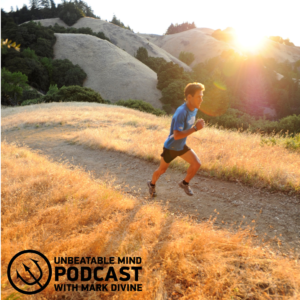
Who Is Dean Karnazes?
Dean Karnazes (@DeanKarnazes) has run most of the toughest endurance races in existence. He has completed 50 marathons in 50 days, won the Badwater race in Death Valley and ran 350 miles in just over 80 hours…without stopping. Time Magazine named him one of the “Top 100 Most Influential People in the World.”
He’s also a NYT Bestselling author. Among his books, Dean’s most recent is “The Road to Sparta” regarding Dean’s faithful re-creation of the run that the Athenian Pheidippides took from Athens to Sparta in 490 BCE. He’s also written a book called “Ultramarathon Man: Confessions of an All-Night Runner,” that details his mindset and how he got into ultra-running.
Mark and Dean discuss the upcoming “300” ruck that Mark will do in September from Sparta to Thermopylae and get into the importance of mental toughness in ultra-endurance sports, and the preparation that goes into one of Dean’s feats of endurance. We all need to welcome greatness and use obstacles for our greatest successes. Listen in to understand Dean’s determination and mindset and to be inspired.
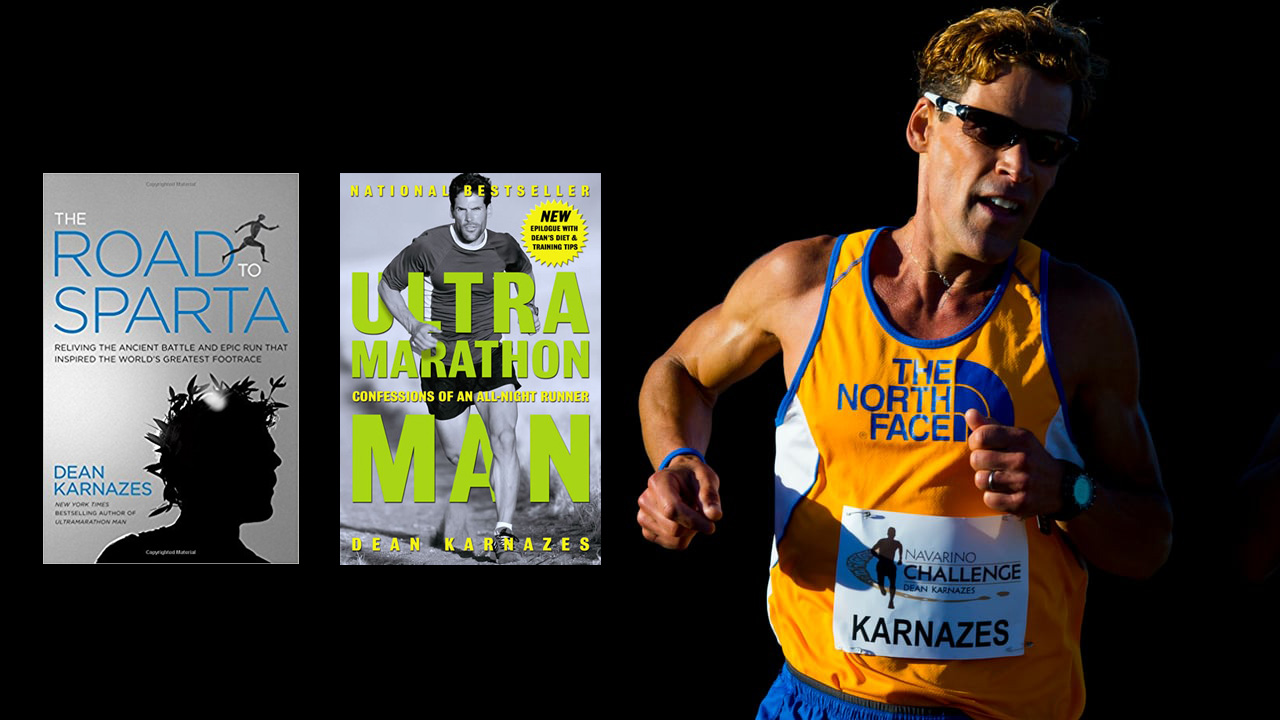
Love the Unbeatable Mind Podcast? Click here to subscribe on iTunes.
We’d love your feedback, please leave a rating and review.
Transcript & Shownotes
Discussing Ultra-Endurance & Determination with Dean Karnazes
Hey folks. Welcome back. This is Mark Divine with the Unbeatable Mind podcast. Super-stoked to have you here. Really appreciate your time and your focus. And your commitment to Unbeatable Mind.
And today’s guest is going to be fantastic. We have Dean Karnazes on with us. I’ll tell you a little bit more about Dean in a moment. And we’ll get going.
But before I do, you know the deal, we are now available on iTunes, Google Play, Stitcher, Soundcloud and also our website. So we’d love for you to leave us a review on one of those places. And if you want to get on our email list, to find out about all the cool things that we do, go to unbeatablemind.com/podcast.
And all sorts of cool things going on, so I won’t get into all the things going on in HQ, down in Encinitas. Where we’re moving to Carlsbad in the next month. Wow! But we’ll talk about that some other time.
[02:28]
“Now Dean has been named by Time magazine as one of the hundred most influential people in the world.”
Cause we got a lot to talk about with Dean. Now Dean has been named by Time magazine as one of the hundred most influential people in the world. That is freakin’ cool. I wanna figure out how to do that.
Men’s Fitness said he was one of the fittest men on the planet. Dean’s an ultra-runner. Like this guy doesn’t stop. He just told me, he doesn’t even own a car. Which would force him to run many places.
He’s competed in some of the toughest endurance events on the planet. But Dean, of course, is more than just a crazy runner. He’s a bestselling author. A business guy and a philanthropist.
So Dean, welcome. Dean Karnazes. Thanks so much for your time today. Super-stoked to have you here.
Dean Karnazes: Yeah, thanks for having me. I hope I can live up to that very lofty introduction.
Mark: (laughing) I know, I feel the same way when people introduce me. I’m like, “Uh, really? Okay, let’s go.”
But yeah, so I scanned through your book because my friend Michael Ostrolenk was begging me to read it. We’re heading to Sparta in September to hike the trail that Leonidas took with his 300 Spartans to go beat the Persians.
Now, you’re book is “The Road to Sparta,” which was about that same battle for Western Civilization and about the beginning of the Marathon. Tell us about that event and about the book first. Usually I don’t get into this ’til later, but it’s so interesting, I thought it’d be a great place to start. And like why you did that. And what that was like.
Dean: Yeah, it’s a fascinating story, and I’m really excited to hear you’re doing what you’re doing. But the story is with the battle of Marathon, which is one of the first recorded actual military conflicts. And what happened in 490 BCE is the Persians invaded Greece. And they landed at a place called Bay of Marathon. And from there they were going to attack Athens. Athens was badly outnumbered and they realized they needed recruit some might. As you know, who’s the most badass military force in ancient Greece…
Mark: (laughing) The SEALs…Oh, no wait… the Spartans.
Dean: (laughing) Yeah. Bring in the SEALs.
So they dispatched this guy to run to Sparta from Athens. And you’ll see some of the terrain that that entailed. It’s 153 miles in rocky, hot, southern Mediterranean territory. And so this guy Pheidippides ran to Sparta to recruit the Spartans. And eventually ran back to Marathon. And then somehow the Athenians overthrew the Persians. And then he ran up to the Acropolis and he proclaimed, “Nike, nike,” which means “victory, victory. We are victorious. And then, of course, he died.
So…
Mark: (laughing) No way! His nutrition off or something. So wait, did the Spartans run back with him? Or did they have to get their shit together.
Dean: Here’s the ironic thing… he got to Sparta and the Spartans, they were very religious, as you know. And they stuck to their beliefs. And they were not allowed to leave for battle until the moon was full. And it was 6 days until there was a full moon. So they told Pheidippedes–this Athenian–we’ll be coming to battle. But we can’t dispatch for 6 days. So the Spartans never got… by the time the Spartans did get there, the Persians had already been defeated.
But as you mentioned in your introduction, that was a temporary setback for the Persians. 10 years later they resumed their battle against Greece. And this time it was a land force that came across, and there was the famous conflict at Thermopylae. And you’ll see that, first-hand, where this took place. This melee.
Well you’ll see kinda where it took place. Right now, where it took place is no longer there because kind of underwater 2500 years later. But it’s a close proximity to where that famous battle took place.
Mark: Yeah, they call it the “Hot Gates.” So can you still see kind of that channel where they channeled the Persians into those Hot Gates, or is that gone?
Dean: Oh, you can see the pass where they channeled them. Absolutely. And, you know, Thermopylae… Therma and there’s a lot of therma in Greece. Especially, as you’ll see, southern Greece. And these were basically places where… they’re mineral ponds where hot water bubbles up from the earth. And they’re therapeutic as well. So that’s a where the name “Thermopylae” came from. The Hot Gates. There was a lot of hot water in the area.
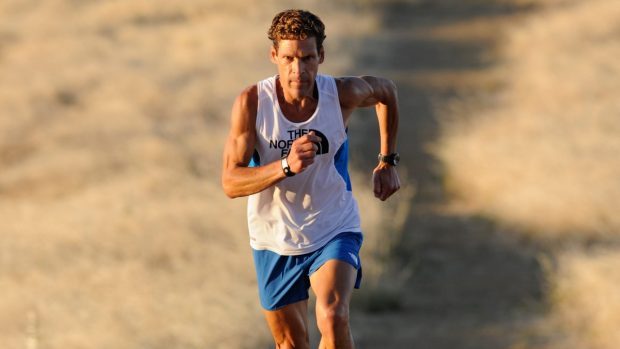
Mark: So you’re Greek. Obviously, with that name and so you probably had some familiarity with this culture and this battle. But what truly inspired you to go run the 150 some odd miles from Marathon to Sparta to retrace those steps?
Dean: You know, one I wanted to put my head at where these ancient Greeks were. I mean, these were very sophisticated endurance athletes. And this is 2500 years ago. I wanted to learn more about their training, and their mindset. And how they could possibly do something that long ago that many modern ultra-marathoners struggle to achieve today. And so, I threw myself into it.
“And I figured the only way to really experience it is to go do it. And to use the ancient foods. So I recreated this race. This 153-mile ootrace from Athens to Sparta. And I only ate figs and olives. Cured meat, like, beef jerky.”
And I only ate figs and olives. Cured meat, like, beef jerky.
Mark: And did you find this stuff along the way? Like the runner might have? Or did you bring it with you? How did you work the logistics?
Dean: Yeah, when I did some of my training runs, I did some foraging. So I definitely foraged. But during the actual… the run itself. I had… I kinda packed this stuff with me. You know, in like a hip-pack.
But I only drank water as well. I didn’t drink any sort of electrolyte replenishment beverage. And, I’ll tell you what, it adds a whole new meaning to running 153 miles when you’re relying on these types of foods…
Mark: Yeah, how did you get your salt intake?
Dean: The cured meat is very salty and they would salt it. It’s essentially a beef jerky if you imagine that. And you’ve probably… beef jerky… it’s really salty. The sodium content’s really, really high. So I was eating that.
The other thing was, because I’m from that region, inherently I don’t sweat much. So I don’t have such a tough time with my electrolytes because I don’t perspire that much.
Mark: Interesting. And the other question about this is was there any record of actually how this guy or other ultra-runners from 2500 years ago actually ate and trained? And do you know, did he just run non-stop? Or did he sleep at night for a couple hours? Or where did you find your information?
Dean: Yeah, so I worked with a guy named professor Paul Cartledge. Who’s a foremost authority on ancient Greek culture. And he’s from Cambridge University. So an incredible mind. I can’t tell you. This guy… he’s like a walking Wikipedia. Amazing man. And he pointed me toward the historical records from a guy named Herodotus who’s the father of history. And we culled through Herodotus looking for specific references to what they call hemerodrome which was a class of citizens… hemerodrome means “all-day runner.” So these were ultra-marathoners. That was kind of the Greek strategic advantage. That they could dispatch these foot messengers that could cover terrain faster than horses. So if they needed to get intelligence to other city-states like Sparta or Corinth. Or if they needed to disseminate information. They would send out these foot messengers. It was kind of like a faster Internet.
“So we learned how these guys trained and we learned about the foods they ate. We learned about their culture and their mindset. I mean, you know these things are half physical but half mental as well.”
Starting the Run
[10:41]
Mark: Absolutely. Okay, so we’ll get into the mindset later. Cause that kind of dovetails into one of the core tenets of this podcast. But let’s kind of back up and go back to your early life. Where did you grow up and what was childhood like? And how did you find a passion for running back then?
Dean: Yeah, I was actually born in LA. Obviously, both my parents are Greek. And I remember running home from kindergarten when I was 6 years-old. So that’s kind of my earliest recollection of running. I couldn’t sit still in class.
Mark: So was that just to get away from school? Was your mom on your way to pick you up or something? And she passed you while you were sprinting home?
Or did you tell your parents, “I’m running home from now on.”
“To me, education took place as I was running.”
Dean: That’s exactly how it happened. I was the oldest of 3. And when we had my sister–the youngest child–my mom was having a hard time getting me home from school. My dad was working 2 jobs. So I just said, “Mom, you don’t have to worry about getting me home.” And she said, “Well, how you going to get home?” And I said, “Well, I’m just going to run.” And she thought it was crazy, but I just started running home. And I found that it was kind of my way of relating to the world is just running. I hated sitting still in the classroom. To me education took place as I was running. I felt all the things a runner feels. I saw the leaves change colors. The seasons change. I felt the differences of temperature on my skin.
All those sort of things a runner experiences I took in at 6 years-old. And then moved to San Clemente, so not far from you, for high school. Ran competitively in high school as a freshman on our cross-country team. And then I stopped running when I was 15 years-old. Didn’t run for 15 years.
And on the night of my 30th birthday… Then I moved to San Francisco. So I went through college, I went through graduate school. I went and got a business degree. And on the night of my 30th birthday, I’m in a bar in San Francisco. Doing what we do on our 30th birthday. I’m drinking with my buddies. And at midnight I said to these guys, “Hey, I’m leaving.” And they said, “Hold it. Where you going? It’s your 30th birthday. Let’s have another round of tequila.”
I said, “No, I’m gonna run 30 miles right now to celebrate my 30th birthday.” And they looked at me and they say… Yeah, that’s what they did. They laughed. They said, “You’re not a runner. You’re drunk.”
Mark: (laughing) That sounds like something a Navy SEAL… that’s exactly what we do in the SEAL teams. But we usually wouldn’t go run 30 miles. We’d go swim like 3 or 4 miles. But… that is awesome.
Dean: I didn’t know you guys did that, but what a great… It’s a great way to get out the door. So, you know… I sobered up after 15 miles and I thought, “What the hell am I doing? This is ridiculous.”
Mark: I’m sure. Yeah, right. “This is nuts.” Now I assume you had your running shoes on when you went out. You didn’t just like run in your Dockers or something.
Dean: No, no. I wasn’t a runner back then. I didn’t even own running shoes. So I remember they were like gardening shoes. They were like Reebok tennis shoes. And I… luckily I had these silk boxers on under my pants. I just took off my pants and started running in these silk underwear.
(laughing) I was so drunk.
Mark: (laughing) That is awesome.
I’m sure you turned a few eyes.
Dean: It ended up… I ended up running on this road to a place called Half Moon Bay so I got out of the city pretty quickly. And I was out there all by myself, and like I said, at 15 miles I sobered up and I thought, “This is crazy.” But it kinda just felt right.
“I was at a decision point where it was either like… what do you do? You gotta keep going. There’s nothing out here, so you just keep going. And I just ran straight through the night.”
Mark: Yeah, you either turn around and run 15 miles back or you just keep going.
Dean: Yeah, I had no choice.
Mark: And when you got there, what’d you do? Call your friends and say, “come pick me up?” (laughing) Of course, they were hung-over.
Dean: I don’t want to date myself, but this is before cell phones. So I got to… essentially Half Moon Bay is kinda like the north county. There’s Highway 1… so at Highway 1, there was this 7-11 with a payphone out in front. So I called my wife, collect. And she’s picked up the phone. I woke her up.
She said, “You didn’t come home. You’ve never not come home before. Is everything okay?” And I said, “Yeah, everything’s fine. I just need a ride back to the house.”
And she said, “No questions asked. I’ll come get you. Where you at?”
And I said, “Well, I’m out in front of 7-11.”
And she said, “The 7-11 down on Geary Street?” There was a 7-11 about a mile from our house.
I’m like, “No. The 7-11 in Half Moon Bay.”
And she said, “What? How did you get there?”
And I said, “I ran.” She said, “You ran from where?” I said, “I walked out of the bar at midnight and ran to Half Moon Bay.”
And she said, “You know what? You don’t sound very stable. Just hold tight and I’ll be right there.”
Mark: (laughing) She’s going to take you to the padded room.
Dean: Yeah, so she came and schlepped me home.
Mark: That’s a really cool story. So you were hooked after that, I imagine.
Dean: Yeah, the story goes I started running. And I thought I was this beast of a runner. Like, “Wow, I just ran 30 miles.” I was running 5 or 6 miles a day.
And then there was this one path I took to get back to my house. It was up this really steep hill called “Lover’s Lane,” that has some military history. It’s where the guys stationed in the Presidio used to walk up this steep hill into downtown San Francisco. If they got lucky, they’d walk home with a woman. And so it’s Lover’s Lane.
But I’m running up this steep hill, and these 2 guys pass me. And I’m like, “What the Hell? No one passes me.” And I couldn’t keep up with these guys.
And I got to the top–and they’re running with backpacks on as well. And they started doing pushups. I’m like, “Who the Heck are these guys?”
Well it ends up they were 2 Army Rangers. And they were training for a 50 mile footrace they told me. And I just couldn’t wrap my head around it.
I thought, “Hold it. 50 miles? Where are the stops along the way? How many days does it take? Do you stay in tents or hotels?”
And these guys just looked at me and he’s like, “Buddy, the gun goes off and you run. When you get to the finish line, you stop.”
And I just thought, “Hold it. A human being is incapable of running 50 miles.” So I went and did some research on this race, and found it where it was. It was outside of Sacramento. And I thought, “I gotta try this.” And that was kind of how I got into ultra-marathoning.
Ultra-marathons and Badwater
[16:58]
Mark: That is super-cool. Now since, you’ve run… You’ve sought out pretty extreme challenges. You’ve run through Death Valley and you’ve run down in the south pole. Tell us about what it’s like to run 50 or more miles in those extreme temperatures. It’s one thing just to get out and do that when the weather’s nice. But it’s another thing to do in 120 degree weather or below zero.
Dean: Yeah, I imagine some of your listeners probably have heard of this race called the Badwater Ultra-Marathon…
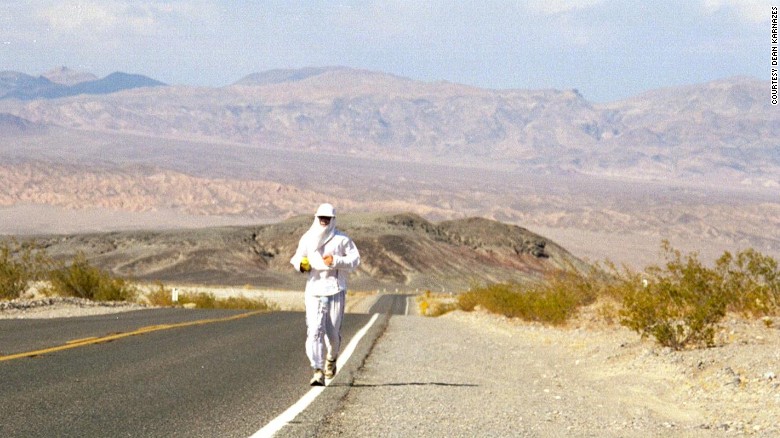
Mark: Oh, yeah. Got some friends who’ve run that.
Dean: Yeah, no doubt. But Badwater’s the lowest place in the Western hemisphere. It’s right in the middle of Death Valley. It’s also the hottest place on earth. So the hottest recorded temperature ever… it was close to 135 Fahrenheit… was recorded in Badwater. And from this lowest point, the highest point is Mount Whitney which is the highest point in the contiguous US. So the idea is to run 135 miles non-stop from the lowest point to the highest point. Across Death Valley. And of course the race is in July. The middle of summer. Where it gets pretty hot.
So what is it like? It’s other-worldly. It’s a place that is about as far away from being on planet Earth as you can get, but still be on planet Earth. When it’s 110 degrees, it’s hot. When it’s 115, it’s hot. When it’s 125, it’s a whole ‘nother level of just psychotic heat where weird things start happening. Plastic starts melting. Your shoes start melting. And it is such an intimidating event. The first time I tried it, I’ll never forget getting out of the car in 125 degree temperature, and it owns you. It commands… it so takes you over and you’re so paralyzed with fear and like, “How am I going to do this? This is ungodly.”
“I mean, you can’t breathe. It’s suffocating. Your eyeballs dry out. I mean, everything is different. To me it was just the ultimate test of physicality as well as mental toughness.”
Can you get yourself through this and how?
Mark: Do you have to acclimatize or do you literally just go there, get out of the car, and 3-2-1 go?
Dean: No, I do all sorts of specialized training. I run around here where I live in just north of San Francisco, and I run around in my North Face ski parkas in the middle of summer. On hot days. I run through the middle of the day wearing a big ski jacket. I go into the sauna at the gym and do sets of pushups and sit-ups. So you try your best to heat acclimate.
But I’ll tell you what; it’s really hard to replicate what it feels like when it’s that hot because you’ve gotta run in it. And weird things happen. The roof of your mouth… the soft palate on the roof of your mouth can get sunburned if you’re panting too much, cause the reflective UV off the asphalt. So you gotta remember to keep your mouth closed. Your… The epithelia in your sinuses start sloughing off, cause it’s so dried out. Your eyeballs burn. I mean, there’s just all kinds of miseries that are thrown at you. You’ve got to overcome.
Mark: God. So how long… or how much of the 135 miles is in Death Valley, in that kind of unbearable heat?
Dean: You know, you get out of Death Valley after about 45 miles. But it goes from being 125 to being 115.
Mark: (laughing) Big relief.
Dean: Yeah. I’ll never forget running… one time I was running this race. In the middle of the night, it’s 2 AM. The low temperature was 114 degrees. And that was the chill of the night. 114.
Mark: And do you have a support crew or are you all alone when you do these things?
Dean: No, you have a support vehicle. And it kind of piggybacks up the road every few miles to provide support. So…
Mark: Mm-hmm. So that becomes your micro-goal. Just get to the vehicle, kind of thing.
Dean: Get to the vehicle. Yup.
And it’s a goal but also it’s a curse because you’ve got a car that can pull over on the side of the road. And you can get to it pretty easily. And when you’re miserable, what do you want? You want comfort.
Mark: (laughing) You can also get inside of it.
Dean: (laughing) Yeah, you just want to get inside the Air Conditioned vehicle. So a lot of times when I’m really hurting I tell my crew, “Go 10 miles up the road.” And they’re like, “You’re dying. You’ll never make it 10 miles.” I’m like, “Go 10 miles up the road.”
Mark: “And when you see me, start driving.” (laughing) Don’t let me in.
That’s fantastic. In a really sick kind of way. Wow. I’m just trying to visualize that.
Dean: Yeah, I encourage you if you ever get a chance just to go out there and experience it in the summer. Just go to a place called Stovepipe Wells. Or go to Furnace Creek in the middle of summer and just get out of the car and run a mile. And just experience it.
Mark: Yeah, I’m just wondering if I could do it. But I think I probably should start with a shorter race. I’ve done marathons, but maybe like a 50 miler before I try the Death Valley…
Dean: Yeah, the Badwater… one, it’s really hard to get into the event. You’ve gotta submit a resume and they accept like, 75 people. And these are some of the toughest guys from around the world.
I could see you doing it, but…
Mark: Hey wait, I’m supposed to be in that category. I haven’t applied yet.
So let me ask you another question, you said earlier something that kind of caught my attention… that you don’t sweat very much because of where you grew up in Greece. What’s up with that? Like, why do Greeks not sweat very much?
Dean: Well, one, because the more you sweat the higher the probability that you’re going to throw your electrolytes out of balance. So it’s typical of people from hotter climates to be very vascular. Very good at shunting blood to the surface. If you look at my arms or my legs, the capillaries, the veins and everything, the arteries… especially when I get hot… just come to the surface so I look very vascular.
If you’re a heavy sweater, you’ve gotta replace those… the sodium, the potassium, the magnesium, the chloride. And that becomes tricky business. Because it’s easy to take in too much as plain water versus too much electrolytes. So it’s advantageous not to sweat that much.
Mark; And I grew up in a cold climate, and genetically I’m from Viking territory. So I do sweat a lot. Which would be a challenge for me.
Dean: Well, you know, sweating is a good thing, especially for shorter durations. Cause it helps your body cool. You get the evaporative cooling.
But if you’re talking about 10, 20, 30, 40 hours of sweating, then it becomes tricky business to maintain your electrolyte balance.
Mark: Now I have to ask you this because my producer Allison made a note of this and she bolded it. Saying that you have a condition which allows the body to rapidly flush lactic acid from your system before it builds up in your muscles. What’s up with that?
Dean: Yeah, so I’ve been tested as a lot of elite level athletes have been tested. And every endurance athlete has the ability to buffer lactic acid.
So you probably know what lactic acid is. It’s the by-product of cellular respiration. And the quicker you can kind of clear that out of your system, the longer you can go. It’s a limiting factor for endurance. But they found–for some reason–I have this unique ability to stave off the accumulation of lactic acid for periods where they’ve never kind of seen this before.
And this is not a sprint. So if you look at me sprinting… Like my VO2 max, for instance–which is kind of the capacity to get oxygen to your muscles when you’re really giving an all-out effort. It’s high… it’s in the mid-60s which is pretty high. But it’s not extraordinary by any means.
But my lactic acid threshold as they call it, is quite extraordinary, and I think that helps me. I don’t ever cramp. I don’t have a lot of problems that typically runners that are running those kind of durations really do.
Mark: Do you think that’s a genetic thing? Or is it because you’ve been running since you were in kindergarten?
Dean: It’s both. Like I said, every endurance athlete has a… they’ve got elevated lactic thresholds. So you see this any sort of marathoner, ultra-marathoner, triathlete. But my mom’s family come from a place called Ikaria, an island in Greece. It’s where Icarus… you know, the kid with the wax wings crashed. And Ikaria is one of the “blue zones.” I don’t know if you know of the “blue zones?”
Mark: Yeah. People who live over 100.
Dean: Yup. So it has the highest concentration of centenarians anywhere. On this island of Ikaria. And I’ve been there. And I’ve run with men and women that are over 100 years old. And they’re like mountain goats. They’re incredible how they climb up hills. And if you look at their legs, and it’s amazing.
So, yeah. They think it might have something to do with my heritage coming from that island as well.
Mark: Yeah. That’s fascinating. Yeah, the epigenetic effect of just being around that over the centuries gets passed down.
Dean: Yeah, it was funny. I’ll just tell you a quick story. I was speaking to this woman, and she’d just gotten back to the village. She was 104 years old. And she was very disappointed. And I was asking why she’s disappointed, and she said, well, she’s an entrepreneur. And started a new business. And she had walked down to the bank.
So she walked down from her village, 3 miles down this really steep hill to the bank, to get a loan.
And the loan officer said, “We’re sorry. We have a policy. We don’t loan money to people over 103.”
So she walked back to the village without a loan. She said, “I’m just so disappointed. I walked all that way and I couldn’t even get a loan.”
Mark: (laughing) What the heck? I would have been inspired to loan it to her myself. Holy cow. That was really cool.
Well, that’ll have to change. Banking system. But that’s a whole different subject, isn’t it?
Dean: Well, the tragic thing, I think is she is incredible. But the generations of Greeks that are younger are not quite as healthy. Which is unfortunately… her offspring are not as healthy as she was, so that… I don’t know… that whole long life lineage is going to be genetically diluted in the future.
Mark: Well, hopefully, the work that you’re doing, and we’re doing, and others will start to inspire people toward holistic health again. There’s a lot of work in that area being done. But there’s a lot of people out there to reach. That’s for sure.
Cross-Country Running Tour – 50 Marathons in 50 States in 50 Days
[29:41]
So let me ask about… still on this topic of doing crazy things. Because I think people want to know about crazy things, and how you endured them. But this one particularly intrigued me.
It’s not so much, you know… I totally get that you can run 50 26 mile marathons. But doing it in 50 states and 50 days is a serious logistical challenge. So tell us about that.
Dean: Yeah, you know, I just thought it would kind of be the ultimate road trip if you will. Kind of around the world in 60 days.
Mark: (laughing) That’s like 800 miles, isn’t it? In 50 days. That’s crazy.
Dean: Well, I mean, it’s over 1000 miles of running, but as far as the travel goes… that was the toughest element is this, you know, sleep deprivation and running. You run a marathon, you don’t want to sit on a bus for 8 hours, driving to the next state, and that’s inevitably what was happening.
But it was also very fascinating… I think a business story that could be told about this event. Because you’re right, the logistics were daunting. And I thought, “I can’t do… I can’t train for this thing and do all the planning. There’s just too much.”
So I worked with this company called Hawkeye Sports and Entertainment, and they have done a lot of logistics. They’ve helped with the Olympic Torch Run across the country, and they’re like, logistics experts. So they really did all of the mapping and so forth and the routes to get me from state to state.
Mark: And so what was in it for them? Was there some corporate sponsorship or media around this?
Dean: Yeah, that’s a really good question. So I partnered with the North Face. You know the North Face. And I structured this as an expedition, so I was a North Face athlete. And they had this formal expedition program, where you submit expedition proposals and they’ll fund it if they think it’s worthy.
Well traditional expeditions are what… guys climbing Everest. Or some peak in Nepal. And I thought, “Let’s shift the paradigm a bit. And view expeditions as being ‘something adventurous.’ Like running 50 marathons in 50 states in 50 days.” And they said, “Wow. That sounds great. We’re behind it. We can’t fund the whole thing, but let’s go out and see if we can get some other sponsors.”
So we literally called I think, we made like 5 sales calls on 5 sponsors. And the first 5 sponsors all said, “Yes. Sign me up.” Muscle Milk immediately… on 1 conversation signed me up. Toyota signed me up. Timex. It was incredible. People thought it was just the greatest sort of endeavor ever. So we got these corporate sponsors. We eventually had to turn down corporate sponsors cause we were kind of over-subscribed. And it wasn’t really set up to be financially a profitable thing. We just wanted to cover our costs.
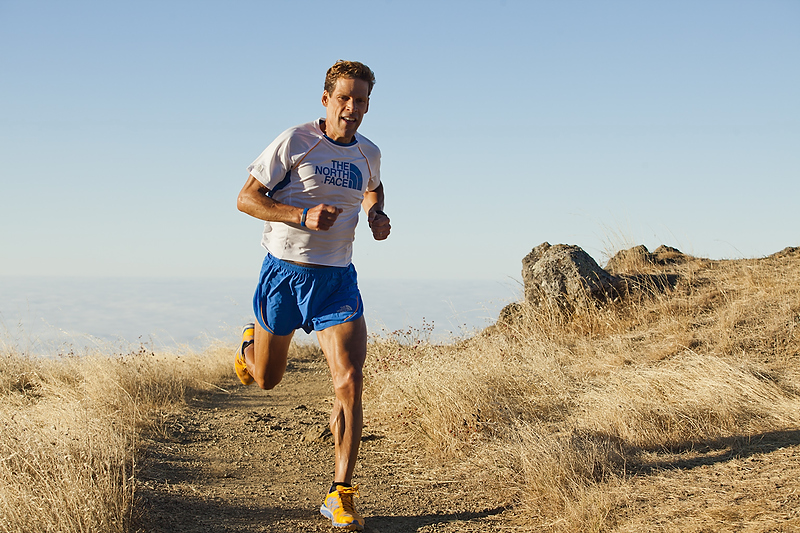
But that said, it put a lot of pressure on me. Because I thought, “Suppose I die after 5 marathons?” I didn’t know if I could do it. And I thought, “Now we have all these people… they’ve thrown in a lot of money to kind of back this thing.” And there’s a little pressure to keep going. So it was interesting.
Mark: That’s ironic. (laughing) Because if you had died that pressure would have been completely off. We’re happy you didn’t, by the way.
Dean: (laughing) Well, It’s funny because the North Face, I learned, took out an insurance policy on me.
Mark: (laughing) No way!
Dean: (laughing) Like they’d get a lot of money if I died. I’m like, “Hey guys. Hold it, here.”
Mark: (laughing) That’s really funny. Oh my gosh.
So did you have to like drink Muscle Milk, and drive around in a Toyota and wear a Timex?
Dean: I did. You know, I’m loyal to those brands. I’m a loyalist by nature. And they stepped up to support me, so I thought, “You know what? I’m supporting these guys.”
And I like their products. I mean, when we looked at who do we go after as sponsors, I kind of said, “What products do I currently use and believe in?” And that’s kind of how we chose our sales list, if you will.
Mark: That’s cool. We’re in some early discussions with Timex based upon doing a watch based upon kind of the SEALFIT, functional training model. They’re a good company.
Dean: Yeah, I mean, the people I was working with, I don’t think are there any longer. But they were great to work with. They were really supportive.
Nutrition and Diet
[34:05]
Mark: So since we brought up Muscle Milk, can we talk about how you fuel yourself when you train for and do one of these events? And I know you have a… one of your degrees, your undergraduate is in fueling science or nutrition science. So let’s talk about nutrition for a bit. Nutrition for extreme endurance.
Dean: Yeah, it’s… you’re right. I studied food science in graduate school, and food technology’s a really interesting field. And, you know, I’ve kind of gone from trying to engineer food, to relying more on simple foods. So kind of going full circle where now I look… especially when I’m training.
“So my daily meals when I’m training are kind of a hybrid between a Paleo-diet. Mediterranean. Pescatarian, so I eat a lot of fish. Primarily cold water fish. But if you can’t pull it from a tree, or dig it from the earth, or catch it with your hands I pretty much don’t eat it.”
So nothing… no rice… nothing that has to be processed. I don’t eat any sort of grains that have to be refined and tooled and reconstituted to eat them.
Mark: Okay. That sounds a lot like what we recommend except for practical purposes, I recommend the 80/20 rule. So 20% of the time, don’t worry about it. That’s when to have rice and grains. But try to 80% of the time eat basically exactly what you said. Paleo, whole food, close to the earth. So that works… I was curious, though, for ultra-runners, do you have any problems with your glycemic index? I mean how do you get enough carbohydrates and sugar into your system? Or are you in a total ketogenic state when you run and train.
Dean: I would say half the time I’m in the ketogenic state… so I love nut butter. So and this is with honey. I really like cashew nut butter. Tahini, which is sesame seed nut butter. Hazelnut butter, which puts you, as you know, in a ketogenic state.
“The other thing that I do when I’m out during my training diet, I eat a ton of fruit. Primarily organic fruit.”
Which is kind of counter-intuitive cause people think, “Oh, there’s all this sugar in fruit.” I’ll tell you what, I don’t have any sort of glycemic response to a lot of fruit. And again, I’m eating the skin on the fruit. Whole fruit. If you saw the way I eat an apple, you’d say, “Wow. You eat the stem, you eat the seeds, you eat the whole apple.” Yes, I ate the whole apple. There’s a lot of fiber in the apple. It slows down the absorption of sugar.
So I’ve finger prick myself and look at my blood sugar levels. I don’t have any sort of response. I could eat 5 apples and my blood sugar barely budges.
Mark: That’s interesting. Huh.
So, I’m gonna have to look into that. Cause I like fruit, but I veer away from eating a ton of it, for that reason. Because I was also fed that kind of story that it had a glycemic impact. But maybe it doesn’t, right? If you eat the whole thing. I like that.
Dean: Well, I tell you. There’s a guy named Michael Orenstein, I don’t if you’ve ever had him on, but he’s a fruititarian. He’d be a fascinating guest, because he defies science. I mean, I know Michael pretty well and all he eats is fruit.
Mark: Is that right?
Dean: I thought he was shitting me at first. I’m like, “You’ve gotta be kidding.” Cause he’s fit. I mean, the guy is ripped. He’s got good muscle mass. And he only eats fruit. And I said, “Okay, I want to see your iron levels. You ever had a blood test done? Your iron levels are going to be horrible.”
No, he’s got normal… his RBCs are normal. His hemoglobin is normal. Obviously, he’s got bulk, so he’s not skinny. I’m like, “Where are you getting the protein from?” It’s counter-intuitive, right? He’s getting zero protein.
Mark: Yeah, I don’t see where he’d get protein or fats. Unless he’s supplementing.
Dean: Yeah, that’s exactly right. No. He says, “Well, I eat tomatoes. And tomatoes have 10% protein.” I said, “Michael. Come on. I’m a food chemist. They don’t have a complete protein. Where are you getting protein from? Complete protein?” But he’s been doing this for years. And his hemoglobin A1C is just really stable.
Mark: Huh. It’s almost like a breatharian. Although I haven’t met any breatharians. And if there are any out there, I doubt they’re very healthy. That’s a whole different subject.
I’d like to find a breatharian to interview, by the way, also.
Dean: Well, you know, I do a lot of intermittent fasting. And I’ve been doing that for years. The old Greeks used to call it an “Apostle’s Fast.” And they did it primarily for religious reasons…
Mark: What’s the longest one you’ve done?
Dean: I typically don’t go for more than 24 hours. So I don’t do these really prolonged fasts.
Mark: I met a guy who was really into this kind of breatharian thing. And he said he was working toward it. Which was kind of interesting.
But he said he does 7 day dry fasts. And it just doesn’t sound healthy to me at all to even try that.
Dean: Let me ask you this. This is really weird. Does he drink his own urine?
Mark: That’s a really good question.
Dean: I’ve heard of that.
Mark: Maybe he does. That’s creepy.
(laughing) All right. Moving on.
Dean: I’m disciplined, but I’m not that disciplined.
Mark: Exactly. I’m with you on that. I could probably go with the fruitarian approach…
Dean: (laughing) I’m not a raft floating in the Pacific. I’m not going to drink my pee.
Mark: (laughing) Right. We’re not in survival mode.
Mental Endurance
39:27
Let’s talk about the mental part. So you know, we talk about the Big 4 skills that can really keep you focused and on track during really intense times. And so at SEALFIT what we do… and Unbeatable Mind, actually… we try to train these in normal times so that they’re there for you to use intentionally. As opposed to finding them after you quit. Or…
Dean: Yeah. I call that “artificial trials.”
Mark: Right, exactly. So we set up these trials and we practice these both in daily practice and through these trials. And the 4 skills are breath control. Managing your internal dialogue.
Being able to amplify your imagery so that you have a couple things, 1) you have a clear vision of what you’re doing, and you can see the victory in it. And 2) you might, let’s say, have an image team running alongside of you, or something like that.
And then the last one is micro-goals which we’ve already addressed. Just breaking it down into little tiny, bite-sized chunks.
Do you have a system like that? Or do those kind of resonate with you? What are the tools that you use to stay in the fight?
Dean: Everything you just said completely resonates with me. The other thing that I really practice… Now, it’s really vogue to use this term. It’s almost cliché to use the term “mindfulness.” But I’ve just noticed that I’ve been practicing mindfulness for years.
“Because when the going gets really tough, what I tend to do is to just basically black out everything except the current moment of time.”
So say I’m doing a 100 mile footrace, and I’m at mile 70. And I’m dying. And feel like I can’t make it another 100 feet. I’ve got 30 more miles. How am I going to do this?
Instead of thinking that way, I just completely put out of my mind the thought of the finish line. And I don’t reflect on the past. I just focus on taking one step to the best of my ability. So talk about a micro-goal. I’m talking about take one step to the best of my ability. Okay. Take your next step to the best of your ability. Literally get that granular. Where you’re just… You’ve got the blinders on to everything except the here and now, and that instant of time.
And you can put yourself into almost a Zen-like state, where you can do this for hours and hours. And you’re… time kind of… I don’t know, the whole perception of time gets warped. Because you’re not thinking about anything except right now. And so you’re not thinking, “Wow. This is insane. I’ve gotta do this for 5 hours.”That sort of thought doesn’t even cross your mind. You’re just thinking about next step. Next step.
Mark: Now is that your mantra? Or do you have some sort of dialogue that goes along? To help keep you focused on just that next step?
Dean: Sometimes I say… I kinda repeat that. “Next step.” Just “next step. Next step.”
Mark: Mm-hmm. That’s awesome.
I’ve experienced what you’re talking about many, many, many times. In our Kokoro camp, which I would love to invite you to by the way… And you would really just knock it out of the park. But it’s a 50 hour, non-stop event. But instead of running, you’re rucking and you’re in the ocean, and it’s all about the team. But, you know, you don’t get any sleep. You just keep going. You’re kind of used to that kind of stuff, but most of the athletes aren’t.
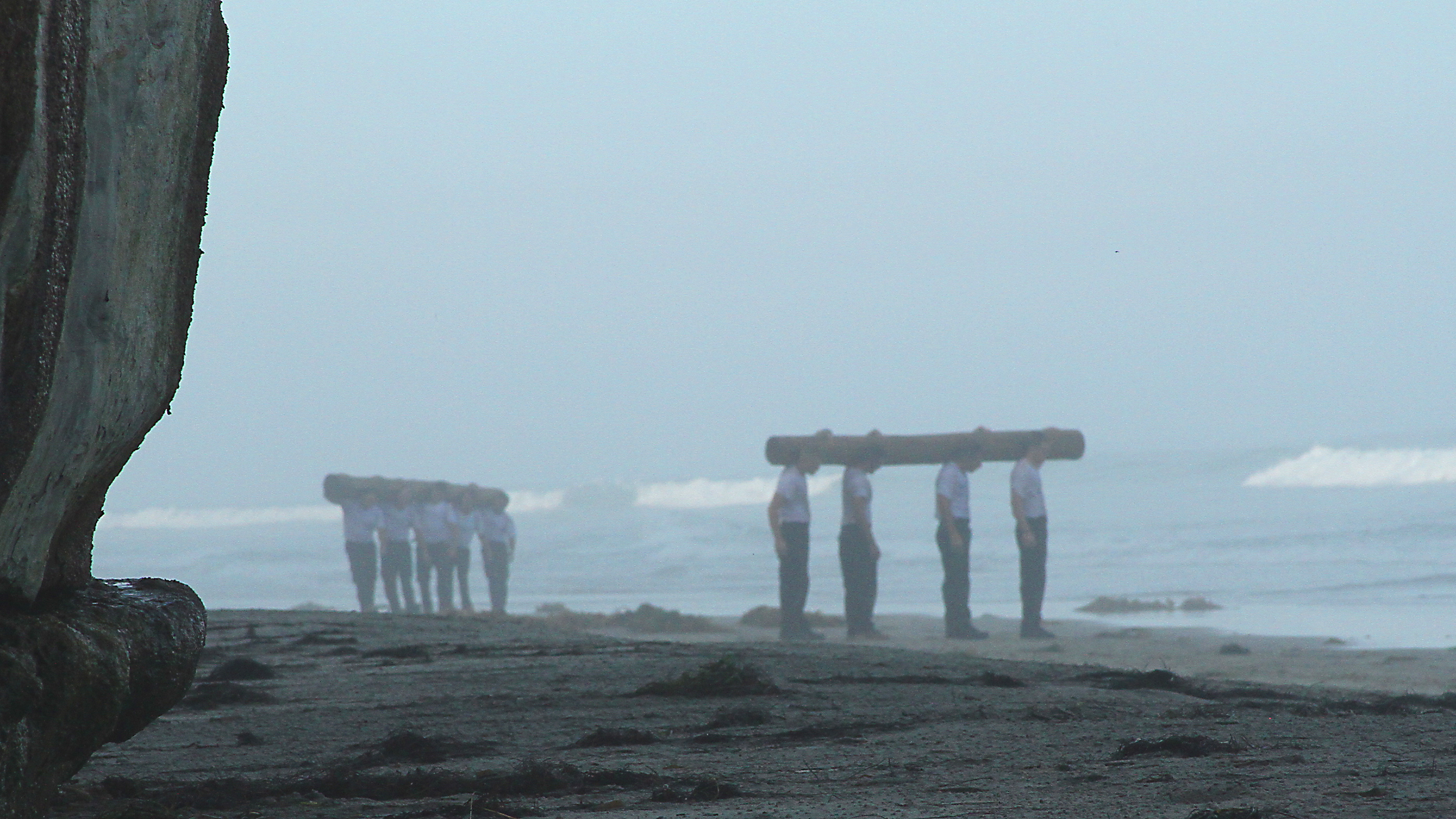 But reports are that people… between hours 30 and 50 they begin to experience these moments where they’re in a flow state for 3 or 4 hours. And they might fall out of it, but they get right back into it.
But reports are that people… between hours 30 and 50 they begin to experience these moments where they’re in a flow state for 3 or 4 hours. And they might fall out of it, but they get right back into it.
And so we’ve been kind of studying that. And what is that? How do you activate flow on demand? And how do you train for it?
Because it’ll certainly… it’ll happen to you if the conditions are right. But our premise is that you can train for it. And obviously through your training you kind of found that naturally. So I imagine that when you start a run, you can pretty quickly get into this state. You don’t have to wait 70 miles, right?
Dean: No. I’ve gotta say that group dynamics add a whole ‘nother element. So I’m pretty good at putting myself in this place. Just kind of on a finger snap. But I’ve done adventure racing, you know? Multi-day adventure races with a group, and that’s a different sort of challenge. Because you’ve got human dynamics that are playing in. And to me, it’s a little bit harder to put your head in that place versus running solo, ultra-marathon.
Mark: That’s true. And what we experience and train for in the SEALs is for that team to find that extended flow state. It takes a lot of training though.
That’s pretty interesting. What about this notion of a higher sense of purpose? Like, why you’re doing things? Does that come into play for you? Like, when you really hit the wall. And you hit the mile 70. It’s one thing to just be mindful of the next step. It’s another thing to say… to remind yourself why you’re doing it. So what’s your “why?”
Dean: To me, there doesn’t have to be a “why.” Amelia Earhart had a great quote. She said, “Adventure is worthwhile in its own right.”
And even Thoreau said… I think he said something like, “Make trials. Attempt them. There is nothing else.”
“It can be the highest calling just to pursue excellence in the endeavor that you’re most passionate about.”
Mark: So succeeding at the experience, the challenge, the adventure. That’s the “why.”
Dean: That’s the exact “why.” And again, I mean, we get back to this idea of artificial trials. I mean, mankind always has the urge to battle, if you will. We’ve been warring ever since we’ve been a species. And the ultra-marathon is basically a war against yourself. Which I like.
“The enemy is yourself. Or the elements.”
Mark: Isn’t that a beautiful metaphor? Because if you can beat yourself, right? If you can defeat your ego, then you have no need to fight someone else. Unless, of course, they’re trying to kill you. But…
Dean: Yeah. I mean, that whole thing to me is… I just don’t see anything artificial about it, because even war…You could argue that war is an artificial trial. I mean, why do we have to war? It’s basically egos involved and the ego’s involved to sign up for an Ironman. It’s the same sort of thing.
Philanthropy and Giving Back
[45:56]
Mark: Interesting. Let’s talk about… we gotta wrap up soon here, because I know that we’ve both got other stuff to do…
Dean: (laughing) I’ve gotta go running. I haven’t got my daily run in yet.
Mark: (laughing) You’ve got some miles in front of you.
What about your philanthropic… How are you seeking to serve and to give back these days? I know that’s really important to you. As it is for us.
Dean: Yeah, so I started a foundation called “Karno Kids.”No one can pronounce my last name, so they always truncate it from “Karnazes” just to “Karno.” And the goal of Karno Kids is to inspire, motivate and energize kids to get outdoors and get active.
And we’re kind of a passou organization, in that I do fund-raising and organizations that apply for grants. We have a board. So there’s a group called “Girls on the Run.” Which has been a beneficiary of ours.
“Girls on the Run” basically takes inner-city, at risk girls and puts them through a 10 week running program to run a 5k. And it really transforms lives. “Kids on Trails” which is an organization that gets inner-city youth out onto trails.
So we have also 14 actual 1k races across the country. The Karno Kids 1k, and they’re affiliated with the North Face.
“So these sort of activities focused on getting kids outside and active are very important to me. Because, let’s face it, that’s our future.”
And it’s harder to influence someone that’s older. We get kind of set in our ways.
But kids are very malleable. And I’ve been doing this now for nearly 20 years, and I have kids that I’ve changed their lives. And they’re great athletes. I mean, they’ve gone on from being just kind of no direction in life, to “Wow. I’m passionate about running. And I’m going to try an ultra-marathon.”
Mark: That’s fantastic. And what is your vision for the future? Are you an optimist? Abundant type person when you look forward? Or are you… Do you see some challenges ahead? Or both?
Dean: No, I travel enough to realize that the world is not as fucked up as we all think it is. I mean, if you sit there and watch CNN all day, you’d think that we’re in such turmoil.
But I was just in Uzbekistan, Kyrgyzstan and Kazakhstan. And they’re asking me, “Wow. Aren’t you afraid, living in America? Everyone hates each other. The police are killing people, and the black people are rebelling…”
And that’s what they said. And I’m in Uzbekistan, which is right above Afghanistan. Thinking, “Wow. Yeah. This is a funny world we live in.”
Mark: That is a funny world. Fascinating.
All right, so your book is called “The Road to Sparta.” Am I right? Did I get the title right?
Dean: That’s the most recent book. Yup.
Mark: And what else have your written? Something about running I bet.
Dean: Yeah, one was… My first one was called “Ultra-marathon man: Confessions of an All-Night Runner.” That’s still been my most popular book. So if you’re looking for kind of introduction into who I am, what I do, I think that’s the most popular.
When are you taking off for Greece?
Mark: We’re heading over there like September 8th, I think. Or something like that. Second week of September.
Dean: Nice. You’re going to feel some heat.
Mark: Yeah, for sure.
So for me, should I read “The Road to Sparta?” Or, since I’m going to be putting in about 300 kilometers… but we’re rucking. So that’ll be a fast walk with load…
Dean: Yeah, I think you’d be fascinated with “The Road to Sparta.”
Mark: Okay. So we’ll get that. “Road to Sparta.”
And all these are available on Amazon. Where can people find out about you personally? Like on social media? Or your website?
Dean: Yeah, I’ll just revert to my website. It’s just ultramarathonman.com. But I’m on Facebook and all these other things. I’ve got a couple hundred thousand followers. So I’m not hard to find. If you’re interested.
Course, you could just come up and run a couple hundred miles with me, and we’ll get to know each other real well.
Mark: (laughing) Might just do that. Be my introduction to ultra-running. Oh my gosh.
So, yeah, cause a lot of the listeners are training for something. Cause part of our gestalt is “get off your ass and go do something really challenging.” And so Kokoro camp is one of the pinnacles. That’s the 50 hour thing I described. That’s our event. But we also push people toward GoRuck and the Spartan Challenge and stuff like that. Or just to go out and do stuff like you do. So a lot of my coaches have run 50 mile races and so we definitely dabble in this area. Some more than others.
But it’s an area that I haven’t done much of myself. I’ve gone kinda the other direction. I do a lot of functional training with weights and I ocean swim quite a bit. And I do run-swim-runs, where I’ll do a mile run and a mile swim and a mile run. You know, stuff like that. Which is my classic SEAL stuff. The way I trained.
But I’m not against…
Dean: I think it’s great you do that, because that’s what you’re passionate about. But I also think it’s great to try new challenges where you get your ass kicked…
Mark: I completely agree. And it actually scares me, so there you go. I’m not afraid of many things. It’s really funny. I just took a friend out ocean swimming the other day and they were terrified. They’re like, “Man, this is not something I’m used to. I’m way out of my comfort zone.” And then they asked me, “What is it that you’re afraid of?”
And now I know. I couldn’t come up with an answer. I’m not afraid of jumping out of airplanes. Not afraid of much. Not afraid of getting shot at. But I am a little afraid of running 50 miles straight.
Dean: Yeah, well, that’s all the reason… Just find a 50 miler. It’s so easy to press that button where it says, “Register Now.” You just it that button and… I know… I can already sense you… Once there’s a race on your calendar three months down the road, you’re going to start training.
Mark: Okay, I’m gonna do this.
“Dean: Fear is a great motivator. You’re fearful. You’re going to train harder.”
Mark: Absolutely. Very cool.
All right. That was awesome Dean. Thanks so much for your time. You rock. I really hope to meet you in person someday soon. Maybe on the trail somewhere. But if not, then maybe our Summit, or some SEALFIT camp. My invitation to come to Kokoro or any of our training holds. So if you find yourself down here and you wanna do that.
Dean: Yeah, and you’re a great interviewer. Thanks for having me on. And do me favor, don’t buy a book. Just check your mailbox.
Mark: All right, everyone. Let’s thank Dean and check out “Ultra-marathon Man.” Did I get that right, Dean?
Dean: Yeah. “Ultra-marathon Man: Confessions of an All-Night Runner.”
Mark: Yeah. So check that out if you’re interested in running and nutrition around endurance. And I know most of you are. Dean’s the man, and we’ll track his progress and support him.
And support his philanthropic effort, “Karno Kids.” That sounds fantastic. Maybe there’s some way that our Courage Foundation could partner with them.
Thanks for listening to Dean and I chat. And thanks for pursuing that Unbeatable Mind and being different. Being uncommon. And challenging yourself. And also leading by example.
We really appreciate it. The world needs you.
Hooyah.
Divine out.



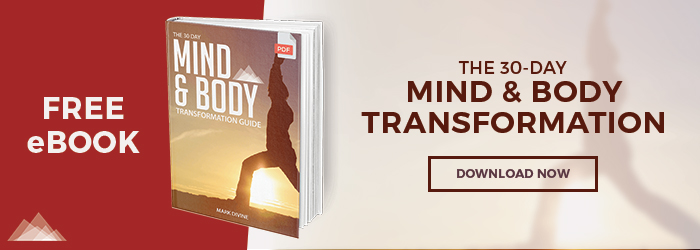
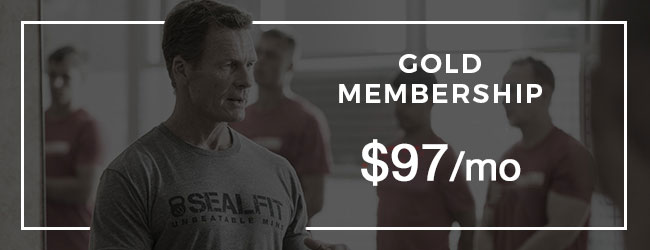



[…] Dean Karnazes telah berlari dan bertahan dalam sebahagian besar perlumbaan yang paling sukar. Dia telah menyelesaikan 50 maraton dalam 50 hari, memenangi perlumbaan Badwater di Death Valley dan berlari 350 batu dalam lebih dari 80 jam … tanpa henti. Majalah Time menamakannya sebagai salah satu “100 Orang Yang Paling Berpengaruh di Dunia.” – https://unbeatablemind.com […]
[…] Photo via UnbeatableMind.com. […]